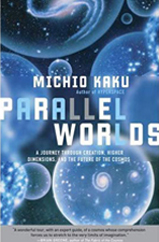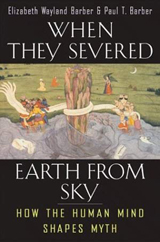Lectures at Caltech Schedule for Spring 2005…
Parallel Worlds:
The Science of Creation, Black Holes,
Superstrings, & Higher Dimensions
Dr. Michio Kaku
Sunday, February 20th, 2:00 pm
at the Baxter Lecture Hall, Caltech, Pasadena, CA
In Parallel Worlds, world-renowned physicist and bestselling author Michio Kaku takes readers on a fascinating tour of cosmology, M-theory, and its implications for the fate of the universe. Kaku begins by describing the extraordinary advances that have transformed cosmology over the last decade, forcing scientists around the world to rethink our understanding of the birth and fate of the universe. The leading theory about the birth of the universe is the “inflationary universe theory,” a major refinement on the big bang theory, in which our universe may be but one in a multiverse, with new universes being created all the time. If parallel worlds do exist, Kaku speculates, in time, perhaps a trillion years or more from now, as appears likely, when our universe grows cold and dark in what scientists describe as a big freeze, advanced civilizations may well find a way to escape our universe in a kind of “inter-dimensional lifeboat.”
Dr. Michio Kaku is the Henry Semat Professor of Theoretical Physics at the Graduate Center of the City University of New York. He is the author of several widely acclaimed books, including Visions, Beyond Einstein, and Hyperspace, which was named one of the best science books of the year by the New York Times and the Washington Post. He hosts a nationally syndicated radio science program and has appeared on such national television shows as Nightline, 60 Minutes, Good Morning America, and Larry King Live.
When They Severed Earth From Sky:
How the Human Mind Shapes Myth
Dr. Elizabeth Wayland Barber
Sunday, March 6th, 2:00 pm
at the Baxter Lecture Hall, Caltech, Pasadena, CA
Why were Prometheus and Loki envisioned as chained to rocks? What was the Golden Calf? Why are mirrors believed to carry bad luck? How could anyone think that mortals like Perseus, Beowulf, and St. George actually fought dragons, since dragons don’t exist? Strange though they sound, however, these “myths” did not begin as fiction. Barber and Barber show that myths originally transmitted real information about real events and observations, preserving the information sometimes for millennia within nonliterate societies. Geologists’ interpretations of how a volcanic cataclysm long ago created Oregon’s Crater Lake, for example, is echoed point for point in the local myth of its origin. The Klamath tribe saw it happen and passed down the story—for nearly 8,000 years. We, however, have been literate so long that we’ve forgotten how myths encode reality. Recent studies of how our brains work, applied to a wide range of data from the Pacific Northwest to ancient Egypt to modern stories reported in newspapers, have helped the Barbers deduce the characteristic principles by which such tales both develop and degrade through time.
Dr. Elizabeth Wayland Barber is Professor of Linguistics and Archaeology, Occidental College, and the author of The Mummies of Ürümchi (W. W. Norton), Women’s Work (W. W. Norton), and Prehistoric Textiles ( Princeton).
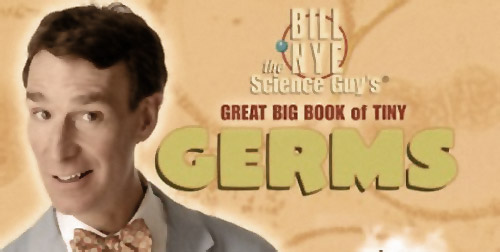
Great Big Book of Tiny Germs
Bill Nye the Science Guy
Sunday, April 24th, 2:00 pm
at the Beckman Auditorium, Caltech, Pasadena, CA
(please note that this is a different location at Caltech,
adjacent to our regular Baxter Lecture Hall venue)
Germs, germs, everywhere! We live with them all day, every day. Did you know that: Some germs are good for you, or even delicious? There are more germs inside you than there are people on Earth? Your body is constantly fighting germs, even when you aren’t sick? Come hear Bill speak, and you’ll learn about these things and more. Find out about germs and how to stay healthy in this delightful presentation based on his new book, as well as a few new things from Nye Labs. Bring the kids, and the kids’ friends, for an afternoon of science and a blast of fun.
Bill Nye is best known for his hit PBS television series Bill Nye the Science Guy, which ran from 1992-1998 and won Emmy Awards for Best Performer, Best Writing, Best Producing, and Best Show. He is the host of the Science Channel’s 100 Greatest Discoveries in Science, and the forthcoming series The Eyes of Nye. He is the author of Bill Nye’s Big Blast of Science, Bill Nye’s Consider the Following, Bill Nye the Science Guy’s Big Blue Ocean, and Bill Nye the Science Guy’s Great Big Dinosaur Dig. He is also an inventor, with patents pending for a baseball retrieval device, a ball throwing technique training gizmo, and an improved ballet toe shoe. As part of the Mars Athena Exploration Team, he played a key role in the design of the MarsDials, the sundials on Mars. Bill serves on the boards of The Planetary Society as Vice President, the New Horizons Mission to Pluto, and the National Health Museum in Washington, DC.
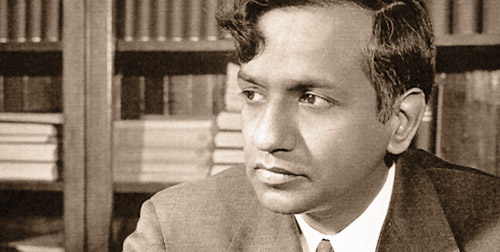
photo: Subrahmanyan Chandrasekhar (Chandra), one of the discoverers of Black Holes, who is featured in Miller’s book and lecture
Empire of the Stars
Obsession, Friendship & Betrayal in the Quest for Black Holes
with Dr. Arthur I. Miller
Sunday, May 1st, 2:00 pm
at the Baxter Lecture Hall, Caltech, Pasadena, CA
In August 1930, on a voyage from Madras to London, a young Indian looked up at the stars and contemplated their fate. Subrahmanyan Chandrasekhar—Chandra, as he was called—calculated that certain stars would suffer a most violent death, collapsing to virtually nothing. This extraordinary claim, the first mathematical description of black holes, rankled one of the greatest astrophysicists of the day, Sir Arthur Eddington, who in 1935 publicly ridiculed Chandra, sending him into an intellectual and emotional tailspin—and hindering the progress of astrophysics for nearly forty years. Tracing the rise of two great theories, relativity and quantum mechanics, which meet head on in black holes, Miller recounts the dramatic story of this intellectual feud. This sweeping history examines the quest to understand one of the most forbidding objects in the universe as well as the passions that fueled that quest over the course of a century.
Dr. Arthur I. Miller is Professor of History and Philosophy of Science, Department of Science & Technology Studies, University College, London. He lives in London.
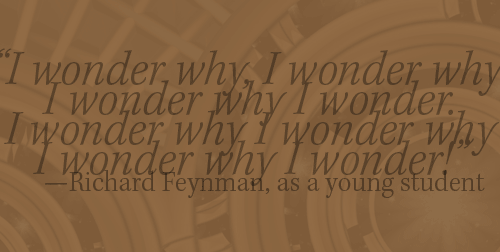
Brain, Mind & Consciousness
The Skeptics Society Annual Conference
Friday, Saturday, Sunday, May 13–15
at the Westin Resort & Hotel
and the Beckman Auditorium, Caltech, Pasadena, CA
Magicians include:
James “The Amazing” Randi
Bob Friedhoffer, the “madman of magic,”
mentalist Mark Edwards
illusionist Jerry Andrus
Scientists include:
Christof Koch: “The Quest for Consciousness: A Neurobiological Approach”
Alison Gopnik: “Children as Scientists: How the Brain Learns to Think”
Steven Quartz: “Neuroeconomics and the Search for Cool”
Richard McNally: “In Search of Memory—True, False, Repressed, Recovered”
Terry Sejnowski: “Sleep, Dreams, and the Subconscious”
V.S. Ramachandran: “Neurotheology and the Search for God”
Susan Blackmore: “Exploring Altered States of Consciousness”
John Allman: “The Search for the Neurological Basis of the Social Emotions”
Paul Zak: “From Whence Trust Comes: Oxytocin and Behavioral Economics”
Hank Schlinger: “Consciousness is Nothing But a Word”
Ursula Goodenough: “From Biology to Consciousness to Morality”
Special Guest:
Michael Crichton in conversation with Michael Shermer.
$150 Skeptics Society members, $175 nonmembers, $75 Students
Register today at skeptic.com or call 626-794-3119
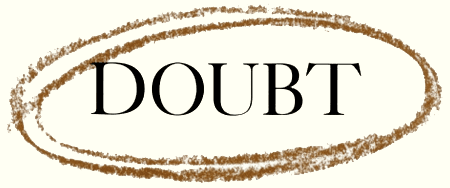
Doubt: A History
with Dr. Jennifer Michael Hecht
Sunday, July 10th, 2:00 pm
at the Baxter Lecture Hall, Caltech, Pasadena, CA
In a sweeping history, Jennifer Michael Hecht celebrates doubt as an engine of creativity and as an alternative to the political and intellectual dangers of certainty. Just as belief has its own history featuring people whose unique expressions of faith have forever changed the world, doubt has a vibrant story and tradition with its own saints, martyrs, and sages. Hecht blends her wide-ranging historical expertise, passionate admiration of the great doubters, and poet’s sensibility to tell a stimulating story that is part intellectual history and part showcase of ordinary people asking themselves the difficult questions that confront us all. Hecht views the history of doubt as not only a tradition of challenging accepted religious beliefs, including the existence of God, but also as a progression of attempts to make sense of life, the natural world, and the self, each on their own terms.
Dr. Jennifer Michael Hecht is an assistant professor of history at Nassau Community College. She is the author of The End of the Soul: Scientific Modernity, Atheism, and Anthropology in France, and The Next Ancient World, her book of poetry, which won the Poetry Society of America’s prestigious Norma Farber First Book Award for 2002, the Tupelo Prize, and ForeWord’s Poetry Book of the Year.
General Lectures at Caltech Information
Admission at the door at Baxter Lecture Hall (no pre-event ticket sales): $5 Skeptics Society members; $8 nonmembers; $5 students
All events are in Baxter Lecture Hall at the California Institute of Technology (Exception: Bill Nye will be in Beckman Auditorium on April 24; tickets may be purchased in advance through the Caltech Public Events office ([email protected] or 626/395-4652) or at the door: $8 Skeptics Society members; $12 nonmembers; $5 students, kids, and anyone under 18.)
Book signing follows all lectures. In the past, lecturers have been happy to sign any of thier works.
directions
Off the 210 freeway exit Lake Ave. south, left on Del Mar, right on Michigan, park in faculty parking lot at end of Michigan; Baxter is at the south-east end of the grass quad; Beckman is on the south end of the parking lot. From the 110 freeway follow to the end and continue north on Arroyo Parkway, right on Del Mar past Lake Ave., follow above directions. From the 101 freeway continue east to the 134 freeway east to the 210 freeway east, exit Lake Ave. and follow above directions. Maps available at skeptic.com


